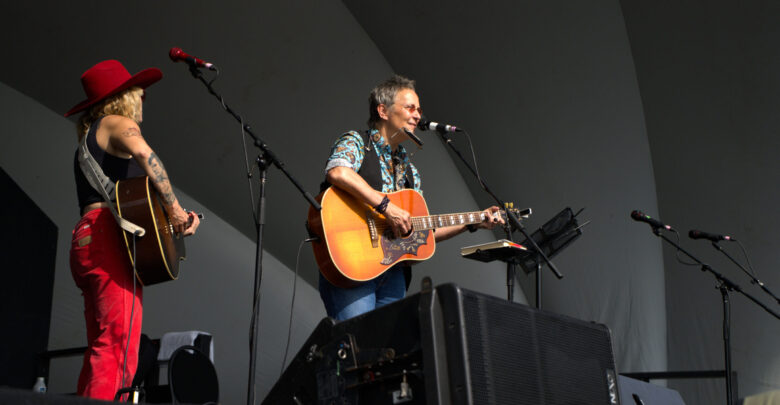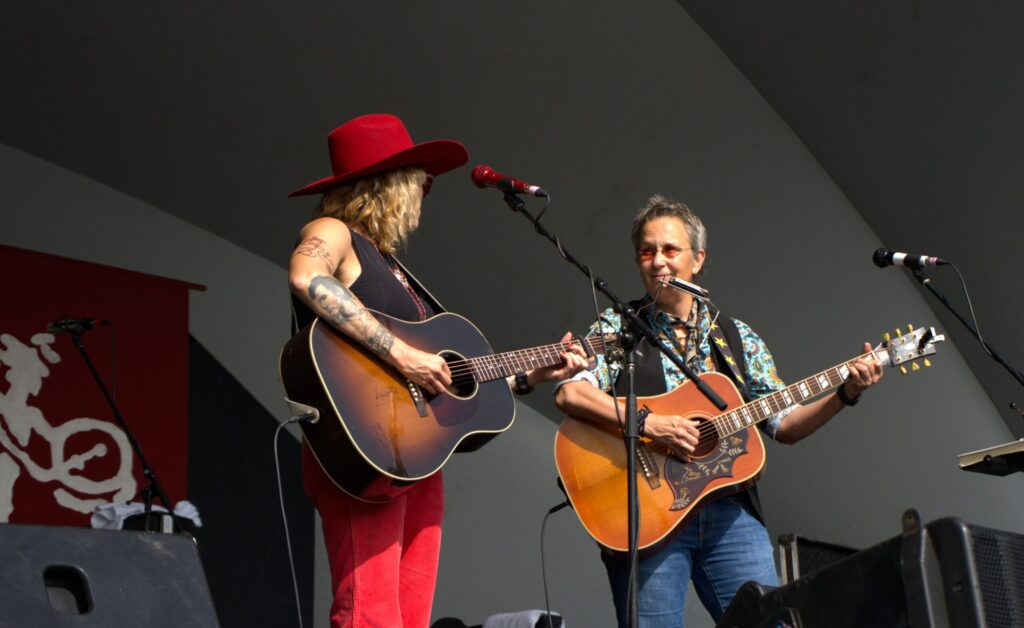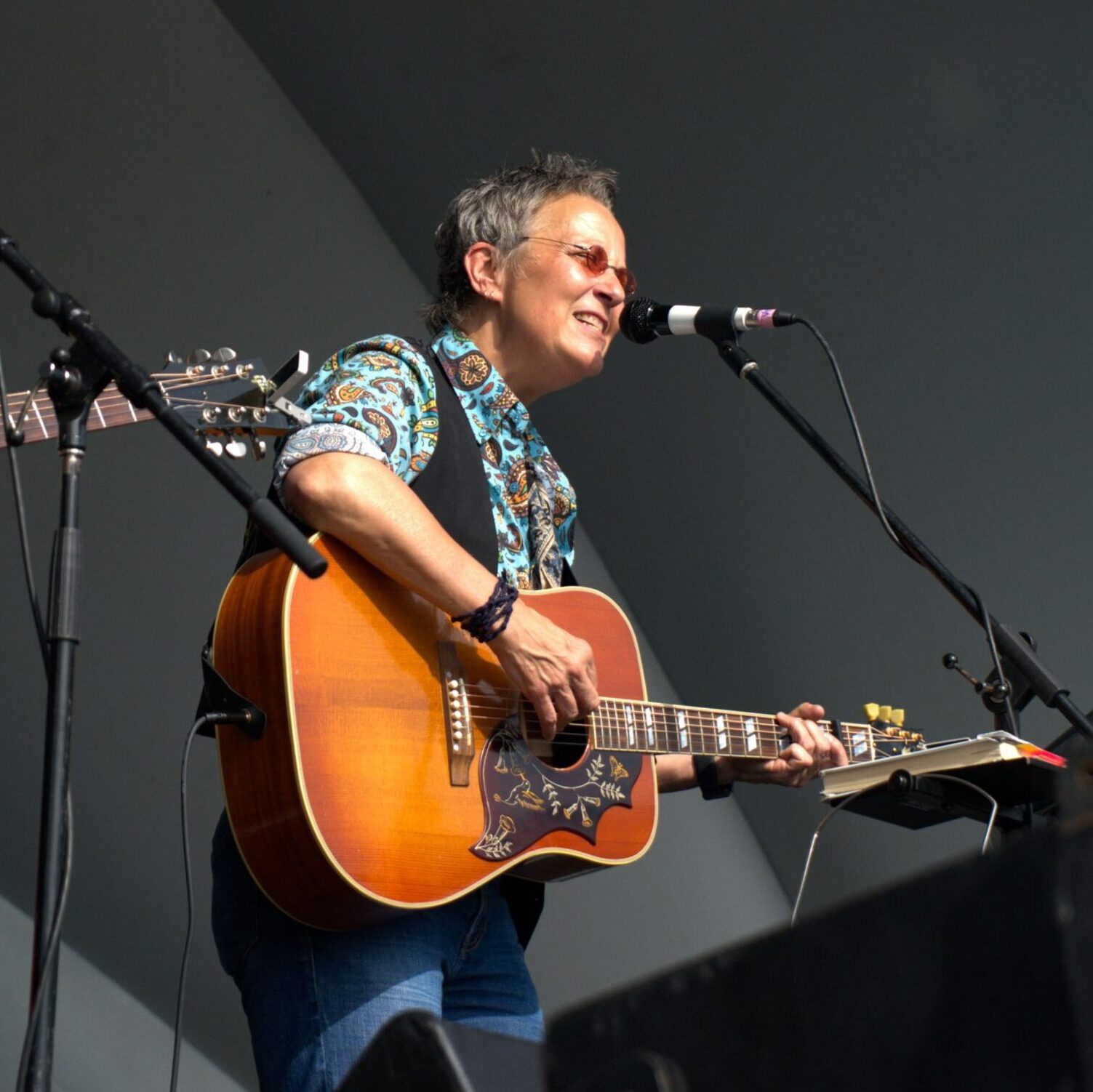Mary Gauthier: Going against the grain and finding healing through music
Over the span of 25 years, Gauthier has made a career of telling big stories and singing the truth.
 Leah Hennig
Leah HennigMary Gauthier returned to Edmonton Folk Music Festival (EFMF) for about her sixth time. In between her sets, she sat down with The Gateway to chat about coming back to EFMF and her music career.
“It’s a real honour for an American to get invited over and over again,” she said. “This is the Canadian folk festival and to focus on Canadian artists, rightfully. So as an American, being honoured by being invited back makes me feel deeply grateful.”
Gauthier grew up in the deep south of the United States. As a queer person, she said she’s always related to people who are rebels.
“I always tend to be like, the fish are swimming this way, I’m going that way,” she said. “I’m the opposite of whatever is happening.”
“I really feel as though music for me has been a way of expressing those things and finding other queer, misfit outsiders. And interestingly, a lot of the audience for me is not gay, it’s people who have felt outside.”
Prior to the interview, Gauthier had just shared the stage with Ken Pomeroy, who came from the Bible Belt of Oklahoma. She said she thinks they share the same feeling of music saving them.
“I think the music has been really important for her as a way of not fighting back, but getting out,” Gauthier said.
For Gauthier, music was part of getting out of addiction. She had been a chef at a restaurant when she was arrested for drunk driving. After her arrest, she got sober and started exploring music more.
“I started going to open mics and wanted to learn how to write songs,” she explained. “I’d always had music in me, but I was a wreck. I was an alcoholic and an addict and I couldn’t possibly get in front of people.”
“I was really, really internal and extremely afraid of everything and everybody. And after I got sober, I started to find my way out of that through songs. I just got to where I didn’t want to be in the restaurant and wanted to be writing songs.”
“For me, I was writing to save my life,” Gauthier says
Now, 25 years later she’s been performing a lot. That has become more of a focus instead of writing and recording new music.
Part of it is because she’s on the road a lot, but also because she wants to spend time with her partner, Jamiee Harris, who sat in on the interview.

“I’m in a place where I want to be with Jamiee,” Gauthier said.
“We still like each other after seven years,” Harris added. “We thought we’d be sick of each other by now.”
“We’re still going strong,” Gauthier said. “And I filled the solitude with writing, so now to write I have to leave Jamiee and go to another place, and I don’t really want to.”
Gauthier also explained that it doesn’t feel as urgent for her to write.
“For me, I was writing to save my life, but apparently I’m going to grow old and so I don’t have that fire that I once got,” Gauthier said. “I think that’s probably a good thing … I just want to travel and play and see the world and connect with the audience and be with people.”
Despite her age, she said she feels like her career is growing and getting bigger. She wants to capitalize on that.
“I want to keep going and see how big we can get it without having the things that people use to make it big, like a band, a big manager, a big record deal. We don’t do any of that … it’s getting big, it is super exciting.”
“They spoke it, I turned it into songs and I sang it for them,” says Gauthier
Part of what attracted Gauthier to folk music specifically was getting to tell big stories. But those stories don’t always have to be some big Disney scene, “it just has to be universal, something we’ve all gone through.”
She undertook a project to tell the stories of Iraq veterans, which became her 2018 album Rifles and Rosaries. She said it was “up to them to tell the stories. But I did know that what I do and what works as a song and as healing is to get to the truth. So my mission was to help them speak and sing the truth.”
She was invited to a program that was founded by a friend of hers, Darden Smith. She said he stumbled into it by accident when he was playing a United Service Organizations (USO) show and felt like he didn’t connect. USO shows are performances for military service members and their families, meant to boost morale.
“As he was backstage hating himself, he started talking to a guy in uniform and realized, ‘oh my god this guy comes from the same town that I do and we have so much in common,’” she said. “Turns out, this guy was in charge of flying bodies home. His job was called Angel Flights … they wrote a song called “Angel Flight” and that song became the foundation of the program.”
Through the program, Smith pairs songwriters with veterans, particularly wounded veterans. Eventually, Gauthier was paired with veterans and their families through the program.
“They spoke it, I turned it into songs and I sang it for them,” Gauthier said. “The truth is hard to come by when you’re traumatized and I know that in my own life. So I know working with people who have trauma, you can’t speak directly to it, but you can point to it.
“Guitar is a great way of doing that through melody,” she explained. “Melody can evoke a lot of feelings. And there’s poetic language, metaphor, that can circle what’s happening without saying directly what happened.”
“And that’s what’s really important anyway is the feelings around it, or the lack of feelings, the frozenness around it.”





